A slightly different angle on basic elements today, partly inspired by the fact that it was Valentine’s Day last weekend.
But before that, quick mention of a fine review that appeared for Far from the Spaceports this week: “lots of believable futuristic technology… a futuristic crime thriller. A science fiction whodunnit if you will… Mitnash and Slate are developed into characters you really care for – and want to learn more about… I can’t wait for the next one in the series…”
Back to basic elements. Up until now, the series has focused on some of the physical necessities of life. But as human beings, we need more than the physical to sustain us. We need the metaphysical as well, in order to give lives meaning as well as substance. So for today we are going to look at celebrations – special times and seasons around which we drape our lives.

To set some basis for this, here is a diagram of Maslow’s ‘Hierarchy of needs’, which he published in 1943 under the title ‘A theory of Human Motivation’. In his scheme, a person could not effectively progress to higher levels of the pyramid, until the lower ones were secure. Now, this scheme can seem artificial, in that people have been known to be highly creative in the most unpromising situations,but broadly speaking it makes sense. According to this, a sense of belonging ranks only just above provision of food, water, and a safe place.
People have throughout history made space for celebrations. As far back as we can tell in the past, there have been events commemorating the natural cycle of the planet – seedtime and harvest, summer and winter. There have also been religious and spiritual special days – fasts and feasts, times to express hope or gratitude, days to commemorate the departed dead or those who lived exemplary lives. Very often we have combined the natural and the sacred together.

My historical writings often feature festival days, particularly In a Milk and Honeyed Land, where events such as the feast of New Wine (in the autumn, marking the start of the new year), midsummer and midwinter ceremonies, and so on, structure the plot. I see them as blending everyday fun with religious devotion, with no particular contradiction between them. The devotions are to the Canaanite pantheon, especially Taliy, who has a high profile in the Four Towns. They are solemn occasions, but they are also (mostly) a lot of fun. They can also be, as such events still are today, a cause for conflict and jealousy.

Today, we have tended to split religious and secular aspects of festivals. Christmas is still a meaningful spiritual event, but for many people the family and friendship aspects of the event have eclipsed any religious meaning. There are, no doubt, people who honour Valentine as a martyred saint, but on the whole his day provides a convenient time for declarations of love, desire and passion… both required and unrequited.

These things are worth commemorating at some point in our lives. For many people, the religious times that are remembered are those connected to fun and enjoyment – a secular society is not so eager to remember fasts and times of denial, however meaningful these still are spiritually.

Looking into the future, my belief is that we will continue to need events and occasions which symbolise meaning. A calendar is not just a succession of days, nor an endless loop of time passing. Rather, it is strung between the key days which impart meaning. About two weeks ago, on January 28th, a great many people around the world remembered the 1986 disaster when the Challenger shuttle blew up – not just a tragedy for the families concerned, but a major setback for the chances of civilians going into space. Positive first events such as the moon landing are also recalled each year – becoming more poignant year by year as the number of living astronauts who have ever walked on another world diminishes.
Suppose in time we are able to colonise the asteroid belt, Mars and its moons, and so on. My guess is that as and when this happens, we will continue to have particular times and seasons which are remembered. Whether or not these are considered religious or social – and I am inclined to think that both will continue hand in hand – seems to me less important than the fact that we need meaning to shape our time-keeping, not just succession.
Now, our calendars will become considerably more complicated at this point, with each planet having its own ‘year’, not to mention the vast variety in orbital patterns of the moons around the planets. Will we adopt a Star-Trek style “star date” to enforce uniformity on the system as a whole, or will we need to keep track of any number of local clocks?
Far from the Spaceports did not include any specific festival days, though readers will no doubt remember the concert scene at Frag Rockers Bar. “Special Night” was a regular event there. The in-progress By Default, however, will have some kind of commemorative event – watch this space.

It’s right to finish with a couple of extracts from Buzz Aldrin’s Encounter with Tiber – one of my favourite science fiction books.
[At the first wedding on Mars, on serving a cake made from soya oil and potato flour, decorated with blue dye] “Something we did today, out of expediency, is going to be fundamental to Martian weddings from now on”… I don’t know if I believed him at the time or not. But twenty years later… that awful cake of Doc C’s has been at every wedding. You can’t get married without having your tongue turn blue…
[Right at the end] This first day on Tiber was more symbol than science, and rightly so, Clio thought. It’s the symbols that we live by.
More next time, probably on communications.
